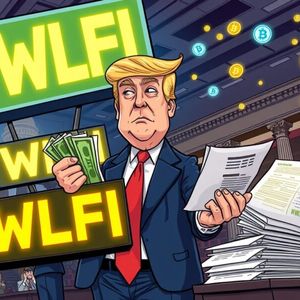BitcoinWorld Crucial: Trump Crypto Bills Face Conflict After $4.1B WLFI Gain The world of cryptocurrency is often intertwined with political developments, and a recent financial event involving former President Donald Trump has cast a significant shadow over the future of Trump crypto bills . If you’re following the digital asset space, you’ll want to understand how a recent surge in his net worth could create unprecedented challenges for the passage of crucial crypto legislation. What’s the Core Conflict with Trump Crypto Bills? Recent reports from DL News indicate a substantial shift in the political landscape for cryptocurrency. Following the public listing of WLFI, former President Donald Trump’s net worth saw an astonishing increase of $4.1 billion on Monday. This sudden influx of wealth has immediately raised questions regarding potential conflicts of interest, especially concerning upcoming debates on Trump crypto bills . Sam Moody, co-founder of the crypto platform Savea, highlighted the immediate concern. He noted that in this new environment, any vote on crypto policy could be perceived as directly influencing the financial interests of the president’s family. This perspective fundamentally alters the dynamics of legislative discussions, making the path for Trump crypto bills considerably more complex. How Does This Impact Future Crypto Legislation? The perceived conflict of interest could create significant hurdles for any major cryptocurrency legislation. Lawmakers, particularly those seeking bipartisan support, might face increased scrutiny and public pressure when voting on bills that could inadvertently benefit the former president. This situation introduces an ethical dilemma that wasn’t as prominent before the WLFI listing, potentially slowing down the momentum for much-needed regulatory clarity in the crypto space. Consider these potential impacts: Increased Scrutiny: Every clause and amendment in proposed Trump crypto bills will likely undergo intense examination. Critics will search for any language that could directly or indirectly favor entities tied to the former president’s newfound wealth, ensuring no undue advantage is conferred. Delayed Passage: The need for meticulous review, coupled with potential pushback from various political factions, could lead to significant delays in legislative progress. Consensus-building becomes far more challenging when personal financial interests are perceived to be at play. Public Perception: The public may view any successful crypto legislation with skepticism, questioning the motivations behind its passage. This erosion of trust could hinder broader acceptance and adoption of digital assets, as the integrity of their regulatory framework comes under fire. These factors collectively suggest a more arduous journey for digital asset regulations moving forward, potentially impacting everything from stablecoin frameworks to taxation of cryptocurrencies. Understanding the Broader Implications for Crypto Policy Beyond the immediate legislative challenges, this development could have wider implications for the cryptocurrency ecosystem’s reputation and operational stability. Transparency and public trust are paramount for the mainstream adoption of digital assets. When political figures with significant financial ties to specific sectors weigh in on related legislation, it can erode that trust, making investors and innovators wary. This scenario underscores the intricate relationship between politics, personal finance, and emerging technologies. The debate around Trump crypto bills now transcends technical aspects of blockchain or market regulation; it delves into fundamental questions of ethics, accountability, and the integrity of the legislative process itself. Such situations can foster an environment of uncertainty, which is generally unfavorable for market stability and long-term investment in digital assets. Historically, similar situations have led to calls for greater financial disclosure from politicians and more robust ethical guidelines for voting on bills where personal financial interests might be perceived. The crypto industry, still in its nascent stages of regulatory development, requires clear and unbiased frameworks to thrive, and this new dynamic complicates that need significantly. Navigating the Intersection of Politics and Digital Assets So, what does this mean for the future of crypto policy in the United States? The path forward demands careful consideration from all stakeholders. For proponents of digital assets, it might necessitate a renewed focus on building broad, transparent coalitions that can champion legislation based purely on merit and public benefit. For policymakers, the challenge is to craft legislation that is perceived as fair, impartial, and free from personal financial influence. This might involve: Establishing clear ethical guidelines for votes on crypto-related matters. Prioritizing bipartisan efforts to depoliticize essential regulatory frameworks. Engaging with a diverse range of experts and public interest groups to ensure comprehensive and equitable outcomes for Trump crypto bills . Ultimately, the goal remains to foster an environment where innovation in digital assets can thrive responsibly, free from the shadow of perceived conflicts of interest. The substantial financial gain experienced by former President Donald Trump following the WLFI listing has undoubtedly added a complex layer to the ongoing discussions surrounding Trump crypto bills . While the digital asset space continues to evolve rapidly, the legislative path now faces heightened scrutiny and potential delays due to concerns over conflicts of interest. Navigating this intricate intersection of personal wealth and public policy will be crucial for the future of cryptocurrency regulation, demanding transparency, ethical considerations, and a commitment to advancing the industry’s best interests. Frequently Asked Questions (FAQs) 1. What is the main concern regarding Trump crypto bills after the WLFI listing? The primary concern is a potential conflict of interest. With former President Trump’s net worth increasing significantly after WLFI’s public listing, any vote on crypto policy could be perceived as enriching his family, thereby influencing legislative decisions. 2. Who raised the initial concern about this situation? Sam Moody, co-founder of the crypto platform Savea, publicly noted that the WLFI situation could turn a vote on crypto policy into a vote on enriching the president’s family. 3. How might this situation affect the passage of future crypto legislation? It could lead to increased scrutiny of proposed bills, potential delays in their passage, and a general erosion of public trust in the motivations behind such legislation. Lawmakers may also face greater pressure. 4. What does EEAT stand for in the context of this article? EEAT stands for Expertise, Authoritativeness, and Trustworthiness. In this article, it means providing well-sourced information, citing experts like Sam Moody and DL News, and presenting a balanced, factual account of the situation. 5. What are some ways to address the perceived conflict of interest? Addressing this could involve establishing clearer ethical guidelines for politicians’ votes on crypto matters, prioritizing bipartisan legislative efforts, and ensuring greater transparency in financial disclosures related to such policies. The implications of this development are far-reaching for the cryptocurrency community. Share this article on your social media channels to spark a wider conversation about the future of crypto legislation and the importance of ethical governance in the digital asset space. Your insights and discussions are vital! To learn more about the latest explore our article on key developments shaping crypto market institutional adoption . This post Crucial: Trump Crypto Bills Face Conflict After $4.1B WLFI Gain first appeared on BitcoinWorld and is written by Editorial Team















